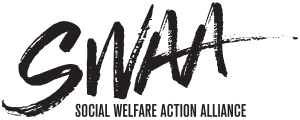Members

Rosemary Barbera, Ph.D.
Interview with National Steering Committee Member Rosemary Barbera
Social Welfare Action Alliance member Rosemary Barbera has been involved in social change since the mid 1980’s. Her first experience with social change was working on the issue of homelessness as well as working on literacy in prisons. She then got involved in Central American solidarity work and against US foreign policy. She moved to Bolivia and then Chile and worked in human rights against the dictatorship of Augusto Pinochet. While she was in South America, in a time when the land was a dictatorship, she recognized human rights were being violated and that hunger was a serious issue
She has developed deep friendships with people in her social change work. Thinking about social change reminds her of two quotations- Che Guevara – “A true revolutionary is guided by a feeling of love;” and Cornel West – “Justice is what love looks like in public.”

Moya Atkinson
About Moya Atkinson
My name is Moya Atkinson and I’m a retired social worker. I received my MSW-equivalent degree in N. Ireland, moved here with family in 1967 following my husband’s career path in electrical engineering/computer sciences. Raising a family took some of my energy, but I also found part-time and then full-time work, mainly in the field of aging. I was the executive director of the National Association of Social Workers, Maryland Chapter from 1993-2002, retired briefly, worked part-time in the N. Virginia area where I live, and retired permanently at the end of 2013.
Faculty Network

The SWAA Faculty Network was created to support faculty members engaged in practice and teaching from outside of the dominant paradigm. It is a group where we share ideas, teaching methods, resources, and build for the future. Past efforts include a SWAA Faculty Forum where members could engage in discussion on issues critical to an engaged and transformative social work and human service practice – inside the classroom and in the streets! If you are interested in ongoing discussions with other like-minded faculty, please let us know. Contact: Joanne Hessmiller (jmhessmiller@gmail.com)
Journal of Progressive Human Services

The only journal of its kind in the United States, the Journal of Progressive Human Services covers political, social, personal, and professional problems in human services from a progressive perspective.
“A brief history of the J. of Progressive Human Services 1976 -2020” by Marcia B. Cohen
(2021) A Brief History of the Journal of Progressive Human Services 1976-2020,Journal of Progressive Human Services, 32:1, 70-72, DOI: 10.1080/10428232.2020.1852646






